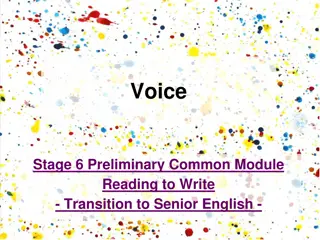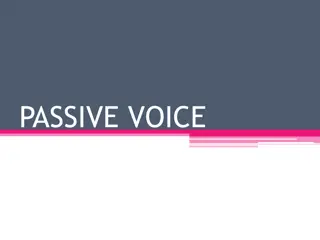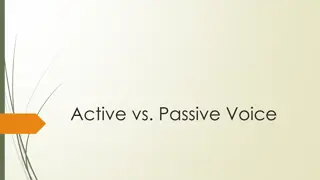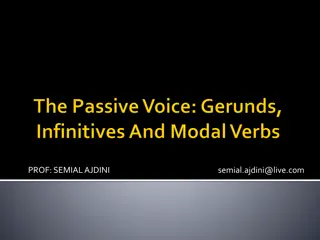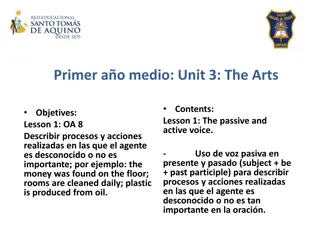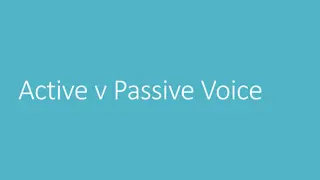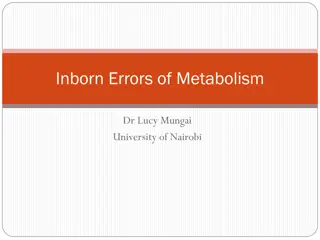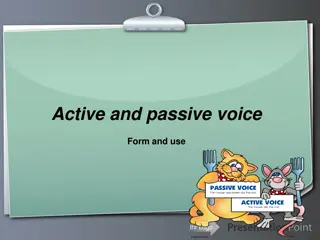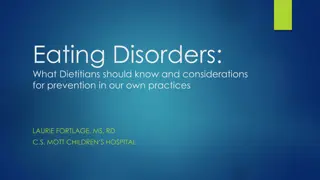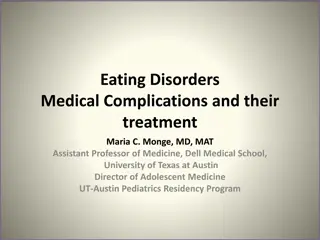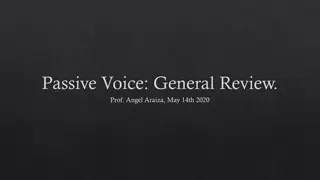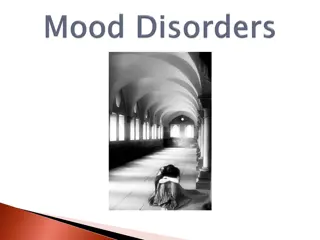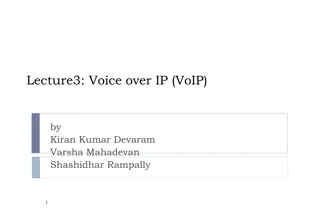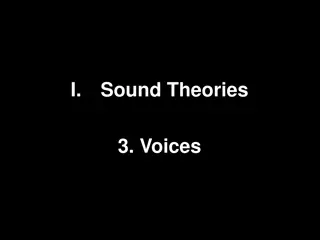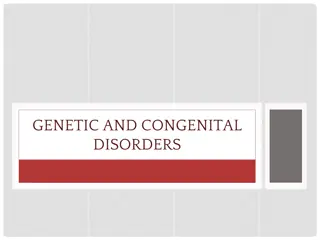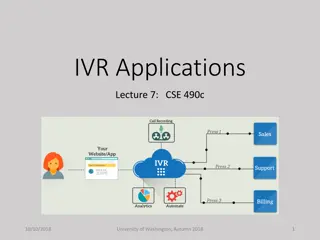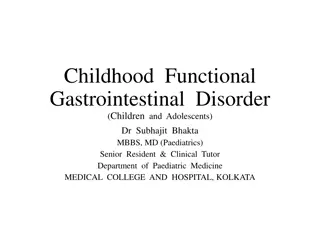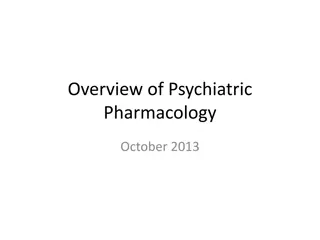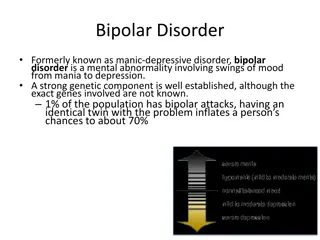Is regressive voice assimilation a mirage?
Delve into the discussion on regressive voice assimilation, challenging traditional views of laryngeal phonology. Explore the intricate phonetic cues and contrasts that go beyond Voice Onset Time (VOT), examining the complexities of active [-voice] in voicing languages. Discover the prevalence of re
2 views • 28 slides
Understanding Active and Passive Voice Usage
Learn about the differences between active and passive voice in English grammar, how to convert sentences from active to passive voice, and examples of active and passive voice usage in different tenses. Understand which verbs can be used in passive voice constructions and practice changing sentence
9 views • 7 slides
Overview of Human Genetic Disorders
Human genetic disorders encompass a range of conditions, from recessive disorders like cystic fibrosis to dominant disorders such as Huntington's disease. Examples include cystic fibrosis, Huntington's disease, and sickle-cell anemia. Understanding genetic disorders involves research and awareness o
0 views • 10 slides
Overview of Anxiety and Related Disorders
Anxiety disorders, such as PTSD, panic disorders, phobias, agoraphobia, and OCD, are characterized by varying degrees of fear and distress. Anxiety is a normal response to danger, but when it becomes chronic, it can lead to debilitating conditions. PTSD occurs post-trauma, panic disorders involve in
1 views • 42 slides
Understanding the Concept of Voice in Literature
Voice in literature refers to the unique personality imparted by an author onto their work, defining how narrators convey stories. This piece explores the definition, types, functions, and roles of voice in literary works, focusing on the author's voice, character's voice, and the interaction betwee
2 views • 11 slides
Understanding Somatic Symptom Disorders, Conversion Disorders, and Dissociative Disorders
Somatic symptom disorders manifest as physical symptoms without apparent cause, while conversion disorders involve specific physical symptoms incompatible with medical conditions. Illness anxiety disorder involves interpreting normal sensations as disease symptoms. Dissociative disorders lead to a s
1 views • 41 slides
Understanding Passive Voice in English Grammar
Explore the concept of passive voice in English grammar through examples and explanations. Learn how to identify passive voice, transform active voice sentences into passive voice, and understand the importance of focusing on the action rather than the doer. Discover the structure of passive voice s
2 views • 7 slides
Understanding Active and Passive Voice in Writing
Active Voice is when the subject performs the action, while Passive Voice is when the subject receives the action. Writers often choose Active Voice for clarity, but Passive Voice is useful when emphasizing the receiver or if the doer is unknown. Avoid mixing voice types to maintain consistency in w
1 views • 6 slides
Understanding Passive Voice and Verb Forms in English
Explore the concept of passive voice in English grammar through examples and explanations of modal verbs, infinitives, gerunds, and verb forms. Learn how to form passive sentences and identify different verb structures. Practice converting active voice sentences to passive voice for a deeper underst
1 views • 9 slides
Understanding Passive and Active Voice in English Language
Learn about the passive and active voice in English grammar, focusing on describing processes and actions where the doer is unknown or unimportant. Explore examples, differences between active and passive voice, and how to convert sentences from active to passive voice. Practice activities to enhanc
1 views • 12 slides
Understanding Active vs Passive Voice in Writing
Active vs passive voice explained with examples, definition, and two ways to fix passive voice. Learn how to change passive voice sentences to active voice with practical examples provided.
8 views • 5 slides
Understanding Inborn Errors of Metabolism and Metabolic Disorders
Inborn Errors of Metabolism (IEM) are genetic disorders that disrupt metabolic pathways, leading to substrate accumulation or product deficiency. These disorders can be classified based on toxic accumulation, protein metabolism, carbohydrate intolerance, lysosomal storage issues, energy production d
0 views • 29 slides
Understanding Co-occurring Mental and Physical Health Conditions
Co-occurring mental and physical health disorders are prevalent and require an integrative multidisciplinary approach for effective assessment and treatment. This holistic approach helps address the complexity of managing multiple disorders in an integrated healthcare setting. Through a multi-direct
1 views • 37 slides
Understanding Functional GI Disorders: A Comprehensive Overview
Functional GI disorders encompass a range of conditions affecting the gastrointestinal system, such as irritable bowel syndrome and disorders of the gut-brain interaction. These disorders are characterized by no structural abnormalities but are influenced by factors like motility disturbance, viscer
0 views • 42 slides
Understanding the Passive Voice and Versatile Verbs
Explore the concept of the passive voice and versatile verbs, including examples and reasons for using passive voice constructions. Learn about verb tenses, when to use passive voice for cohesion or when the agent is unknown, and how to add modifiers to the agent. Discover tips for using passive voi
0 views • 15 slides
Mastering Passive Voice: Verb Forms and Usage
Delve into the intricacies of passive voice in English grammar, exploring verb forms commonly used in the passive voice such as manufacturing, publishing, and more. Learn how to construct passive sentences in Present Simple and Past Simple tenses with examples and practice exercises. Enhance your un
0 views • 6 slides
Understanding Genetic Disorders and Their Impact on Health
Genetic disorders are caused by abnormalities in genes or chromosomes, leading to various health conditions. Inherited disorders can be passed down from parents to children, affecting physical makeup and processes in the body. In India, there is a high prevalence of genetic disorders, particularly i
1 views • 12 slides
Understanding Active and Passive Voice in English Writing
Explore the forms and uses of active and passive voice in English writing with examples and explanations. Learn how to distinguish between active and passive voice, create passive sentences using appropriate tenses, and understand when to use each voice effectively in different situations. Enhance y
0 views • 15 slides
Understanding Passive Voice in English: Usage and Examples
Passive voice is used to shift the focus from the subject to the object in a sentence. The passive construction is formed with the verb "to be" in the appropriate tense followed by the past participle of the main verb. Learn when to use passive voice, how to indicate the agent using "by," and how ad
0 views • 6 slides
Understanding Eating Disorders: Types, Signs, Effects, and Recovery
Eating disorders are mental disorders characterized by unhealthy eating habits and can have severe physical and psychological consequences. This article explores the definition of eating disorders, signs to look out for, different types such as Anorexia Nervosa, Bulimia Nervosa, Pica, and Purging Di
0 views • 10 slides
Understanding Eating Disorders: Insights for Dietitians
Eating disorders are complex neurobiological conditions that are not merely about control or weight management. These disorders can affect individuals of all genders, body sizes, and socioeconomic backgrounds. Dietitians play a crucial role in identifying, assessing, and treating eating disorders, a
0 views • 41 slides
Understanding Eating Disorders: Medical Complications and Treatment
This presentation by Dr. Maria C. Monge covers the common eating disorders in teenage patients, potential medical complications, and the role of the medical team in treatment. It includes definitions of disorders like Anorexia Nervosa, Bulimia Nervosa, and Binge Eating Disorder according to DSM-5 cr
0 views • 60 slides
Understanding Passive Voice and Verbal Times
Passive voice focuses on the object of the sentence, with examples of converting sentences from active to passive voice in different verbal tenses. It explains the concept of subject giving an object in active voice and the reception of the object in passive voice. The importance of subject in a sen
0 views • 9 slides
Understanding Neurodevelopmental Disorders in Childhood and Adolescence
Neurodevelopmental disorders in childhood and adolescence encompass a range of conditions including intellectual disabilities, communication disorders, autism spectrum disorder, and attention deficit/hyperactivity disorder. These disorders impact cognitive development, adaptive functioning, and comm
0 views • 30 slides
Understanding Sleep Disorders: Classification and Diagnosis
Sleep disorders encompass various conditions affecting sleep patterns and quality. They are classified into categories such as insomnia, sleep-related breathing disorders, central disorders of hypersomnolence, circadian rhythm sleep-wake disorders, parasomnias, and sleep-related movement disorders.
0 views • 32 slides
Understanding Passive Voice in English Grammar
This content covers the concept of passive voice in English grammar, providing examples and explanations of how to form passive voice sentences. It includes information on intransitive and transitive verbs, transforming active voice to passive voice, and common passive voice structures. Visual aids
0 views • 16 slides
Understanding Grief and Depressive Disorders: A Comparative Analysis
Grief and depressive disorders share similarities but also have distinct differences. Grief is a universal emotional state following loss, while depressive disorders involve prolonged mood disturbances. The stages of grief include denial, anger, bargaining, depression, and acceptance, with intervent
0 views • 79 slides
Understanding Genetic Disorders and the Human Genome Project
The Human Genome Project, completed in 2003, aimed to identify all human genes and DNA sequences. Genetic disorders, like autosomal disorders and Huntington's disease, can result from mutations at different levels, affecting single genes, chromosomes, or multiple genes. Albinism and cystic fibrosis
0 views • 37 slides
Understanding Voice over IP (VoIP) Technology
Explore the world of Voice over IP technology through this comprehensive lecture covering VoIP basics, motivations, implementation methods, configuration options, main issues, standards, and ISO reference model. Learn about VoIP's ability to make calls over IP networks, motivations behind its use, t
0 views • 37 slides
Understanding Abnormal Psychology: Disorders, Symptoms, and Treatments
Explore the world of abnormal psychology through the lens of different disorders like depression, anxiety, and phobias. Learn about the definitions of abnormal behavior, DSM-V classifications, and various types of psychological disorders. Delve into the complexities of mental health conditions such
0 views • 39 slides
Exploring Theories and Concepts of Voice and Self-Expression
Delve into the realm of voice, self-expression, and consciousness through various theories and perspectives by thinkers such as Derrida and Barthes. The concept of voice is examined in relation to presence, uniqueness, power, and language, highlighting its subjective and spiritual dimensions. Explor
0 views • 34 slides
Mastering Active and Passive Voice in English: A Comprehensive Guide
Explore the fundamental concepts of active and passive voice in English through this detailed guide. Learn how to identify and transform sentences from active voice to passive voice, understand the usage of auxiliary verbs, and practice changing sentence structures effectively. Enhance your language
0 views • 19 slides
Overview of Classification of Psychiatric Disorders
Psychiatric disorders are illnesses with various manifestations that impact functioning due to disturbances in biological, social, genetic, and other factors. Two key classification systems, ICD-10 and DSM-5, categorize over 200 types of psychiatric illnesses. The ICD-10 includes categories like org
0 views • 18 slides
Overview of Genetic and Congenital Disorders and Their Causes
Explore the terminology, causes, characteristics, and results of genetic and congenital disorders, as well as the disorders of single-gene inheritance. Learn about autosomal dominant disorders like Marfan Syndrome and Neurofibromatosis. Discover how single-gene disorders are inherited and their impa
0 views • 24 slides
Interactive Voice Response Applications in University Environment
Explore the world of Interactive Voice Response (IVR) applications in an educational setting through examples like SMS communication, voice applications, advantages of voice and text, technology core features, and social good initiatives. Discover how IVR technology is used for educational purposes
0 views • 14 slides
Understanding Childhood Functional Gastrointestinal Disorders
Functional Gastrointestinal Disorders (FGIDs) in children and adolescents are characterized by chronic or recurring symptoms that cannot be fully explained by current structural or biochemical tests. These disorders emphasize the role of normal development in symptom presentation and the lack of evi
0 views • 46 slides
Understanding Passive Voice in English Grammar
Passive voice in English occurs when the subject receives the action of the verb. This involves changing the order of subject and object, using the auxiliary verb "to be" in the tense of the active voice, and adding the past participle of the main verb. Various tenses can be used in passive voice co
1 views • 5 slides
Exploring the Power of Your Voice: Darfur in Sudan
Unleash the power of your voice through different ways of greeting and using it to spread positivity. Discover how your voice can make a difference by telling jokes, sharing stories, laughing, singing, and advocating for kindness. Watch an inspiring video challenging you to use your voice for good.
0 views • 16 slides
Overview of Psychiatric Pharmacology: A Comprehensive Guide from 2013
This presentation delves into the nuances of psychiatric pharmacology, exploring common psychiatric conditions, historical perspectives on medical treatments, categories of psychiatric medications, and principles of treatment. It also touches on mental illness definitions from DSM-IV-TR and DSM-V, a
0 views • 27 slides
Understanding Mental Health Disorders: Bipolar Disorder, Anxiety Disorders, & More
Exploring various mental health disorders such as Bipolar Disorder, Anxiety Disorders, Generalized Anxiety Disorder, Panic Disorder, and Phobic Disorders. Learn about their symptoms, prevalence, and impacts on individuals' lives.
0 views • 41 slides




